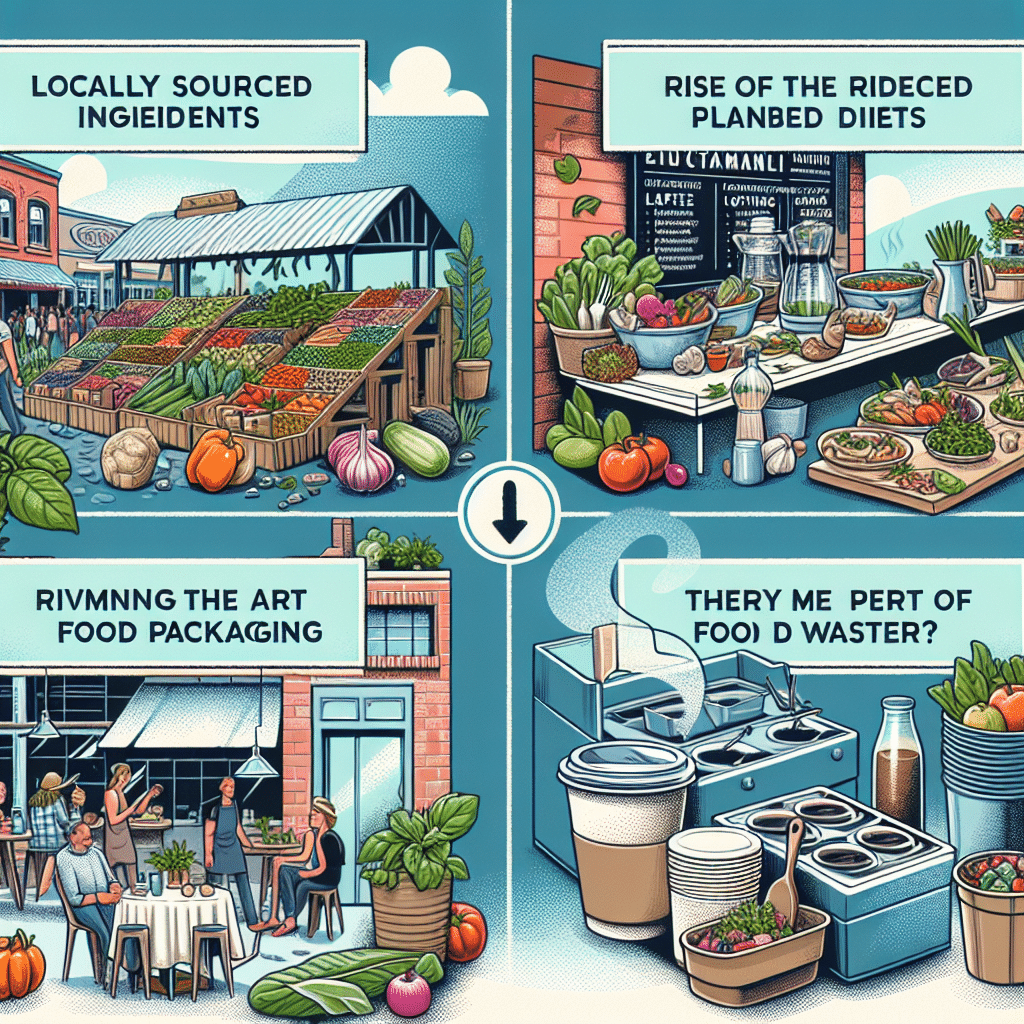Sustainable Foodservice Evolution: 4 Influential Trends
-
Table of Contents
Sustainable Foodservice Evolution: 4 Influential Trends

The foodservice industry is undergoing a significant transformation as sustainability becomes a central concern for consumers, businesses, and regulators alike. With the increasing awareness of environmental issues and the impact of food production on the planet, restaurants, caterers, and other foodservice providers are adapting to more sustainable practices. This article explores four influential trends that are shaping the sustainable evolution of the foodservice sector.
1. Farm-to-Table and Locally Sourced Ingredients
One of the most prominent trends in sustainable foodservice is the farm-to-table movement, which emphasizes the use of locally sourced ingredients. This approach not only supports local economies but also reduces the carbon footprint associated with long-distance transportation of food products. Restaurants are increasingly partnering with local farmers, growers, and suppliers to procure fresh, seasonal produce, meats, and other ingredients.
- Reduced Food Miles: By sourcing ingredients locally, foodservice establishments can significantly cut down on the distance food travels, known as “food miles,” thereby reducing greenhouse gas emissions.
- Seasonal Menus: Chefs are crafting menus based on what is available seasonally, which often leads to fresher, more flavorful dishes and encourages biodiversity.
- Community Engagement: Local sourcing fosters a sense of community and connection between consumers and the origins of their food, promoting transparency and trust.
Case studies from farm-to-table restaurants demonstrate the economic and environmental benefits of this approach. For example, the restaurant “Local Roots” in Virginia has successfully implemented a model that sources over 90% of its ingredients from within a 100-mile radius, showcasing the viability of local sourcing.
2. Waste Reduction and Management
Food waste is a significant issue in the foodservice industry, with vast amounts of food discarded at every stage from production to consumption. Sustainable foodservice operations are implementing strategies to minimize waste and manage it more effectively.
- Composting: Many restaurants now compost organic waste, turning it into nutrient-rich soil for local farms or gardens.
- Donation Programs: Surplus food is increasingly being donated to food banks and shelters, helping to address food insecurity while reducing waste.
- Inventory Management: Advanced inventory management systems help businesses order more accurately, reducing the likelihood of over-purchasing and spoilage.
Statistics from the Environmental Protection Agency (EPA) indicate that more than 63 million tons of food waste are generated in the U.S. annually, with a significant portion coming from the foodservice sector. Initiatives like the EPA’s Food Recovery Challenge encourage businesses to improve their waste management practices.
3. Energy Efficiency and Conservation
Energy consumption is another area where the foodservice industry is striving for sustainability. Restaurants and other food-related businesses consume large amounts of energy for cooking, refrigeration, and lighting. By adopting more energy-efficient practices and technologies, they can reduce their environmental impact and operational costs.
- Energy-Efficient Equipment: Upgrading to ENERGY STAR-rated appliances can lead to significant reductions in energy use and utility bills.
- LED Lighting: Switching to LED lighting, which uses less energy and lasts longer than traditional bulbs, is a simple yet effective measure.
- Renewable Energy: Some establishments are investing in renewable energy sources, such as solar or wind power, to further decrease their carbon footprint.
Examples of energy conservation can be seen in major chains like McDonald’s, which has committed to reducing its greenhouse gas emissions by 36% by 2030, in part by upgrading to more energy-efficient kitchen equipment.
4. Sustainable Packaging and Utensils
Disposable packaging and utensils contribute significantly to pollution and landfill waste. The foodservice industry is responding by introducing sustainable packaging solutions that are biodegradable, compostable, or recyclable.
- Biodegradable Materials: Many businesses are replacing plastic with biodegradable alternatives made from plant-based materials like cornstarch or bamboo.
- Reusable Containers: Programs that encourage customers to bring their own containers or offer reusable containers for a deposit are gaining popularity.
- Recycling Programs: Establishing in-house recycling programs helps ensure that recyclable materials are properly sorted and processed.
Starbucks, for instance, has made headlines with its commitment to eliminate plastic straws globally by 2020, opting instead for strawless lids and alternative-material straw options.
Conclusion
The sustainable foodservice evolution is driven by a combination of consumer demand, environmental necessity, and innovative business practices. The four trends discussed—locally sourced ingredients, waste reduction and management, energy efficiency and conservation, and sustainable packaging and utensils—are not only influencing the industry today but are also shaping its future. By embracing these trends, foodservice providers can reduce their environmental impact, improve their bottom line, and meet the growing expectations of eco-conscious consumers.
ETprotein: Your Partner in Sustainable Protein Solutions
In line with the sustainable foodservice trends, ETprotein offers a range of organic bulk vegan proteins that cater to the needs of health-conscious consumers and environmentally responsible businesses. Their products, including various plant-based proteins and L-(+)-Ergothioneine, are non-GMO, allergen-free, and characterized by a neutral taste, making them an excellent choice for foodservice providers looking to enhance their sustainable offerings.
Whether you’re developing a new menu item or seeking to improve the nutritional profile of your dishes, ETprotein’s high-quality protein products can help you achieve your goals while aligning with the values of sustainability and wellness.
About ETprotein:
ETprotein, a reputable protein and L-(+)-Ergothioneine (EGT) Chinese factory manufacturer and supplier, is renowned for producing, stocking, exporting, and delivering the highest quality organic bulk vegan proteins and L-(+)-Ergothioneine. They include Organic rice protein, clear rice protein, pea protein, clear pea protein, watermelon seed protein, pumpkin seed protein, sunflower seed protein, mung bean protein, peanut protein, and L-(+)-Ergothioneine EGT Pharmaceutical grade, L-(+)-Ergothioneine EGT food grade, L-(+)-Ergothioneine EGT cosmetic grade, L-(+)-Ergothioneine EGT reference grade and L-(+)-Ergothioneine EGT standard. Their offerings, characterized by a neutral taste, non-GMO, allergen-free attributes, with L-(+)-Ergothioneine purity over 98%, 99%, cater to a diverse range of industries. They serve nutraceutical, pharmaceutical, cosmeceutical, veterinary, as well as food and beverage finished product distributors, traders, and manufacturers across Europe, USA, Canada, Australia, Thailand, Japan, Korea, Brazil, and Chile, among others.
ETprotein specialization includes exporting and delivering tailor-made protein powder and finished nutritional supplements. Their extensive product range covers sectors like Food and Beverage, Sports Nutrition, Weight Management, Dietary Supplements, Health and Wellness Products, and Infant Formula, ensuring comprehensive solutions to meet all your protein needs.
As a trusted company by leading global food and beverage brands and Fortune 500 companies, ETprotein reinforces China’s reputation in the global arena. For more information or to sample their products, please contact them and email sales(at)ETprotein.com today.












